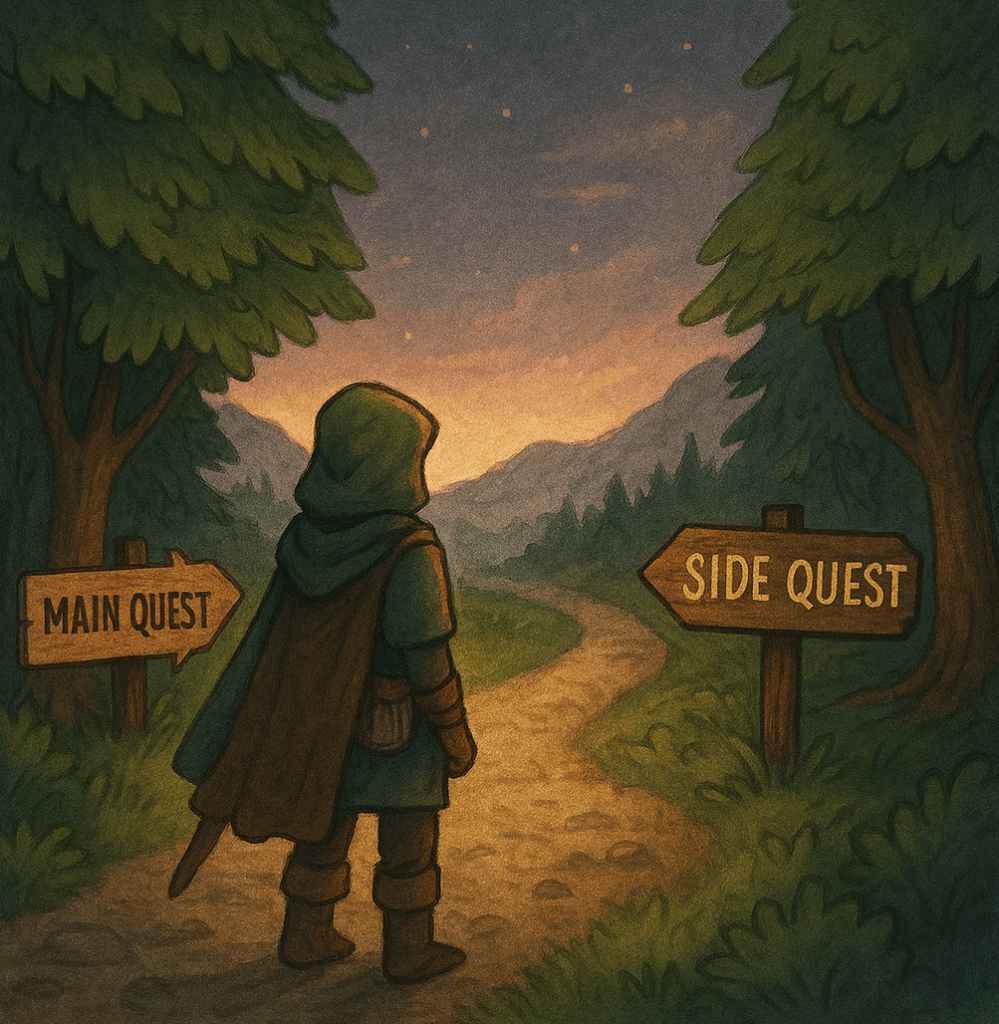You sit down to do your taxes—schedule cleared, documents ready, coffee in hand. Twenty minutes later, you’re knee-deep in reorganizing your computer files. You head to the kitchen to make another shot of espresso. Then somehow, you’re scrubbing under the fridge’s crisper drawer—something you haven’t touched in years.
Sound familiar?
If you have a neurodivergent brain—especially one shaped by autism, ADHD, OCD, or trauma—this kind of detour probably isn’t new. It’s not laziness. It’s not sabotage. It’s your nervous system doing something on purpose.
I call it a side quest. And yes, I named my entire therapy practice after it.

So What Is a Side Quest?
In gaming, a side quest is an optional mission—something off the main storyline. It’s usually unplanned, nonlinear, and doesn’t always seem connected to your main objective. But it’s often where the magic happens: where your character levels up, finds a hidden ally, or uncovers something essential about their journey.
In real life, a side quest might look like:
- Rearranging your bookshelf instead of responding to that overdue text
- Watching three hours of mushroom foraging videos when you meant to fold laundry
- Researching the entire history of a niche fandom instead of finishing your homework
To the outside world, it might look like you’re just procrastinating. But inside, it’s more complicated. These so-called detours are often emotional regulators, portals for curiosity, or ways our brains seek out safety, control, or meaning.
Monotropism and the Pain of Switching Gears
Monotropism—a theory often used to describe autistic cognition—suggests that some brains are wired to focus deeply on one thing at a time. That intense, immersive focus can be a gift. But it also makes task-switching hard.
When your brain is stuck in freeze mode, jumping straight into a complex task—like writing a proposal or filling out paperwork—can feel like trying to swim through quicksand. Instead, your brain might guide you to something smaller, more tactile, or more predictable—like untangling a drawer full of wires, scrubbing the stovetop with intense focus, or matching socks while listening to the same song over and over again.
You may feel productive afterwards, but it wasn’t really about getting something done—it was about finding your footing when the original task felt impossible.
When Side Quests Spiral
For many neurodivergent folks, the line between main quests and side quests is blurry. What starts as “let me check the weather” becomes a two-hour deep dive into climate modeling and bug-out bags. Then comes the shame spiral:
- Why can’t I just do the thing?
- What if I’m avoiding everything important?
- What if I’ve lost the plot?
Especially for folks with OCD or perfectionist wiring, the spiral can include obsessional doubt—what if you’re focusing on the wrong thing? What if you never get to the “real” task? What if your internal compass isn’t trustworthy at all? Or, when your focus shifts to health anxiety, the spiral might look like compulsively checking Dr. Google for reassurance—only to end up more overwhelmed and uncertain than before.
This isn’t just distraction. It’s a deeper kind of distress.
From Shame to Sustainability
So let’s reframe:
What if the point isn’t whether you’re being “productive”?
What if the better question is: Is this sustainable?
If your current strategy relies on panic sprints, guilt loops, or masking your needs, that’s not a time management issue. That’s a survival strategy—and probably one that kept you afloat for a long time.
Sometimes, the side quest is what gets us ready for the main thing. Sometimes, the side quest is the main thing—we just didn’t know it yet.
Why I Named My Practice Side Quest Psychotherapy
Therapy, for many people—especially neurodivergent, queer, and chronically overwhelmed folks—isn’t a straight line either. Healing doesn’t follow a single storyline. It meanders. It loops. It detours. Sometimes what looks like procrastination or distraction is actually your brain finding a way forward—just not the way you expected.
I named my practice Side Quest Psychotherapy to honor those nonlinear paths. The ones where “progress” might look like organizing your closet instead of answering emails. Or deep-diving into a special interest while grieving a loss. Or learning to listen to your body after years of tuning it out.
In this space, your tangents, obsessions, sensitivities, and so-called distractions aren’t obstacles—they’re part of the map. Together, we explore what they’re pointing toward: unmet needs, unspoken grief, protective strategies, and forgotten desires.
You don’t have to follow someone else’s storyline to heal.
This is your quest.
Let’s see where it takes you.
Who I Work With
I built Side Quest Psychotherapy for the ones who’ve wandered off the main path—not by accident, but because the path never fit. For those who’ve lived life in the margins, reading between the lines, sensing everything too deeply or too much. For the seekers, the skeptics, the ones who’ve been told they’re “too sensitive,” “too intense,” or “too much”—and started to wonder if that was true.
This practice is for anyone who’s tired of performing wellness and is ready to explore what healing actually looks like when it honors your wiring, your truth, and your pace.
This is a space where:
- Complexity is honored—not pathologized
- You don’t have to explain why the simple things are hard
- Your sensory needs, rituals, and rhythms are respected
- Your side quests are welcomed—not shamed
Whether you’re in the middle of a meltdown, a life transition, a diagnostic journey, or a spiral about whether you’re “doing it right”—you belong here.
🎉 Side Quest Psychotherapy Opens June 9, 2025
I’m now booking new therapy clients and evaluations!
- Therapy starts next week (individual, family, and caregiver sessions available)
- Adult neurodivergence evaluations begin later this summer
- Child & teen evaluations launch in the fall
If you’ve been waiting for care that meets you where you are—and moves at your pace—now’s the time.
